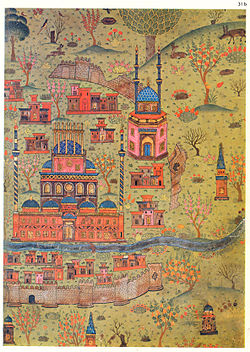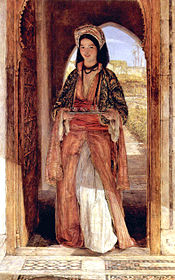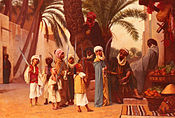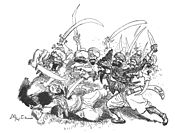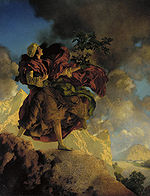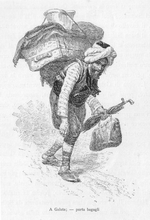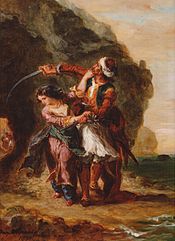- List of One Thousand and One Nights characters
-
This is a list of characters within the medieval collection of Middle Eastern folk tales One Thousand and One Nights.
An artistic expression of a city from the One Thousand and One Nights.
Characters in the frame story
Scheherazade
Main article: ScheherazadeScheherazade (Persian: شهرزاد Šahrzād also called Shahrazad) is the legendary Persian queen and the storyteller and narrator of The Nights. She is the daughter of the kingdom's vizier and sister of Dunyazad (Persian: دنیازاد).
She marries King Shahryar, who has vowed that he will execute a new bride everyday. For 1001 nights, Scheherazade tells her husband a story every night, stopping at dawn with a cliffhanger, forcing the King to keep her alive for another day.
Dunyazad
Dunyazad, Dunyazade, (also called Dunyazatde, Dinazade, or Dinarzad) (Persian: دنیازاد) is the younger sister of Queen Scheherazade. In the story cycle, it is she who (at Scheherazade's instruction) initiates the tactic of cliffhanger storytelling to prevent her sister's execution by Shahryar. Dunyazad, brought to her sisters bedchamber so that she could say farewell before Scheherazade's execution the next morning, asks her sister to tell one last story. At the successful conclusion of the tales, Dunyazad marries Shah Zaman, Shahryar's younger brother.
She is recast as a major character as the narrator of the Dunyazadiad segment of John Barth's novel Chimera.
Scheherazade's Father
Scheherazade's Father, sometimes called Jafar, is the vizier of King Shahryar. Every day, on the king's order, he beheads the brides of Shahryar. He does this for many years until all the unmarried women in the kingdom have either been killed or run away, at which point Scheherazade offers to marry the king.
The vizier tells Scheherazade the Tale of the Bull and the Ass, in an attempt to discourage his daughter from marrying the king. It does not work and she marries Shahryar anyway.
At the end of the 1001 nights, Scheherazade's father goes to Samarkand where he replaces Shah Zaman as sultan.
Shahryār
Not to be confused with Sharia (Islamic law)."Shahryar" redirects here. For other uses, see Shahryar (disambiguation). Queen Scheherazade tells her stories to King Shahryār.
Queen Scheherazade tells her stories to King Shahryār.Shahryār or Shahriār or Shahriyār or Schahryār or Sheharyar or Shahrayar or Shaharyar (Persian: شهريار, meaning The Great King) is the fictional Persian Sassanid King of kings who is told stories by his wife, Scheherazade.
He ruled over a Persian Empire extended to India, over all the adjacent islands and a great way beyond the Ganges as far as China, while Shahryār’s younger brother, Shāhzamān (شاهزمان) ruled over Samarkand. There is an anomaly in the story, for the King Shahryār is a Sassanid, and thus a Zoroastrian and not a Muslim as most of the stories' characters are.
In the frame-story, Shahryār is betrayed by his wife, which makes him go mad and believe that all women will, in the end, betray him. So every night for three years, the mad king takes a wife and has her executed the next morning, until he marries Scheherazade, his vizier’s beautiful and clever daughter. For 1001 nights in a row, Scheherazade tells Shahryār a story, each time stopping at dawn with a cliffhanger, thus forcing him to keep her alive for another day so that she can complete the tale the next night.
Shah Zaman
Shah Zaman or Schazzenan is the Sultan of Samarkand, sometimes called Samarcande and brother of Shahryār. Shah Zaman catches his first wife in bed with a cook and cuts them both in two. Then, while staying with his brother, he discovers that Shahryār's wife is unfaithful. At this point, Shah Zaman comes to believe that all women are untrustworthy and he returns to Samarkand where, as his brother does, he marries a new bride every day and has her executed before morning.
At the end of the story, Shahryār calls for his brother and tells him of Scheherazade's incredible tales. Shah Zaman decides to stay with his brother and marries Dunyazad, whom he has fallen in love with.
Characters in Scheherazade's stories
Ahmed
Prince Ahmed is the youngest of three sons of a Sultan of the Indies. He is noted for having a magic tent which would expand so as to shelter an army, and contract so that it could go into one's pocket. Ahmed travels to Samarkand city and buys an apple that can cure any disease if the sick person smells it. Ahmed rescues the Princess Peri Banu (or Paribanou), a genie.
Aladdin
Main article: Aladdin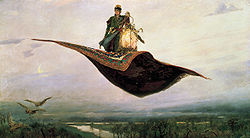 A Magic carpet, was legendary carpet that can be used to transport persons who are on it instantaneously or quickly to their destination.
A Magic carpet, was legendary carpet that can be used to transport persons who are on it instantaneously or quickly to their destination.
Aladdin' is perhaps one of the most famous characters from the Nights and appears in Aladdin and The Wonderful Lamp.Ali Baba
Main article: Ali Baba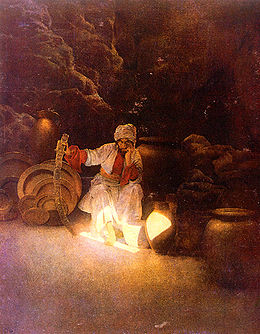 Ali Baba by Maxfield Parrish (1909).
Ali Baba by Maxfield Parrish (1909).
Ali Baba (Arabic: علي بابا) is a character described in the adventure tale of Ali Baba and the Forty Thieves.
Ali Shar
Ali Shar is a character from Ali Shar and Zumurrud who inherits a large fortune on the death of his father but very quickly squanders it all. He goes hungry for many months until he sees Zumurrud on sale in a slave market. Zumurrud gives Ali the money to buy her and the two live together and fall in love. A year later Zumurrud is kidnapped by a Christian and Ali spend the rest of the story in search for her.
Mercury Ali
Mercury Ali of Cairo or Ali the Egyptian appears in The Adventures of Mercury Ali of Cairo. Mercury Ali is a sharper, who repeatedly evaded police (hence the name ”Mercury” or quicksilver). He traveled to Baghdad, where he tried to outsmart the prominent local tricksters Dalilah the Crafty, Zurayk the Fishmonger and Azariah the Jew to win the hand of Dalilah's daughter Zaynab.
Prince Ali
Prince Ali is a son of Sultan of the Indies. He travels to Shiraz, the capital Persia, and buys a magic perspective glass that can see for hundreds of miles.
Badoura
Badoura, a Chinese princess; is the heroine of the story of Camaralzaman and Badoura in The Adventures of Prince Camaralzaman and the Princess Badoura, described as reputedly 'the most beautiful woman ever seen upon earth'.
The Barber of Baghdad
The Barber of Baghdad is wrongly accused of smuggling and in order to save his life, he tells Caliph Mustensir Billah of his six brothers:
- Bacbouc who was hunchback
- Al-Fakik who was toothless
- Al-Bakbuk who was blind
- Al-Kuz who lost one of his eyes
- Al-Haddar who was very lazy
- Shakashik who had a harelip
Camaralzaman
Camaralzaman (Persian: Moon of the epoch, قمر زمان) was the son of King Shahzaman ("King of the Epoch") of the Isle of the Children of Khaledan, twenty days' sail from Persia in The Adventures of Prince Camaralzaman and the Princess Badoura.
After initially refusing to marry, Camaralzaman is introduced by some jinn to lovely young Chinese princess Badoura. and took a concubine named Princess Haiatelnefous, the daughter of King Armanos of the Ebony Island.
Cassim
Cassim is the rich and greedy brother of Ali Baba who is killed by the Forty Thieves when he is caught stealing treasure from their magic cave.
Dalilah the Crafty
Dalilah the Crafty or Dalilah the Wily appears in The Rogueries of Dalilah the Crafty and Her Daughter Zaynab the Coney-Catcher.[disambiguation needed
 ] Dalilah and her daughter Zaynab were left "unemployed and neglected" after death of her husband, a town-captain of Baghdad. Zaynab persuaded her mother to "Up and play off some feint and fraud which may haply make us notorious in Baghdad, so perchance we shall win our father's stipend for ourselves." Dalilah proceeded to trick and fool people, cheat them out of money, jewellery and other goods. After being caught, she managed to sell her pursuers into slavery to the Chief of Police. At the end, she was pardoned by the Caliph and was given important positions of governess of the carrier-pigeons and portress of the Caliph's Khan.
] Dalilah and her daughter Zaynab were left "unemployed and neglected" after death of her husband, a town-captain of Baghdad. Zaynab persuaded her mother to "Up and play off some feint and fraud which may haply make us notorious in Baghdad, so perchance we shall win our father's stipend for ourselves." Dalilah proceeded to trick and fool people, cheat them out of money, jewellery and other goods. After being caught, she managed to sell her pursuers into slavery to the Chief of Police. At the end, she was pardoned by the Caliph and was given important positions of governess of the carrier-pigeons and portress of the Caliph's Khan.Duban
For the crater on Saturn's moon Enceladus, see Duban (crater). Duban is one of the most extraordinarily talented characters of the One Thousand and One Nights.
Duban is one of the most extraordinarily talented characters of the One Thousand and One Nights.
Duban appears in The tale of the vizier and the Sage Duban and is a sage described as being a man of extraordinary talent. The ability to read Greek, Persian, Turkish, Arabic, Byzantine, Syriac and Hebrew, as well as a deep understanding of botany, philosophy and natural history are only a few.
He cures King Yunan from leprosy. Duban works his medicine in an unusual way: he creates a mallet and ball to match, filling the handle of the mallet with his medicine. When the king plays with the ball and mallet, he perspires, thus absorbing the medicine through the sweat from his hand into his bloodstream. After a short bath and a sleep, the King is cured, and rewards Duban with wealth and royal honor.
Yunan's vizier, however, becomes jealous of Duban, and persuades Yunan into believing that Duban will later produce a medicine to kill him. The king eventually decides to punish Duban for his alleged treachery, and summons him to be beheaded. After unsuccessfully pleading for his life, Duban offers one of his prized books to Yunan to impart the rest of his wisdom. Yunan agrees, and the next day, Duban is beheaded, and Yunan begins to open the book, finding that no printing exists on the paper. After paging through for a time, separating the stuck leaves each time by first wetting his finger in his mouth, he begins to feel ill. Yunan realises that the leaves of the book were poisoned, and as he dies, the king understands that this was his punishment for betraying the one that once saved his life.
Hussain
Prince Hussain, the eldest son of Sultan of the Indies, travels to Bisnagar (Vijayanagara) in India and buys a magic teleporting tapestry, also known as a magic carpet.
Morgiana
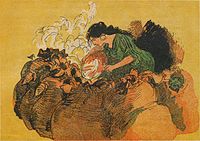 Morgiana pours boiling hot oil into the sacks containing members of the Forty Thieves.
Morgiana pours boiling hot oil into the sacks containing members of the Forty Thieves.
Morgiana or "Morgana" is a clever slave girl from Ali Baba and the Forty Thieves. She is initially in Cassim's household but on his death she joins his brother Ali Baba and through her quick wittedness she saves Ali's life many times and eventually kills his worst enemy, the leader of the Forty Thieves. As reward, Ali frees her and Morgiana marries Ali's son.
Parizade
Princess Parizade is the daughter of the Sultan Khosrou Shah in the story The Two Sisters Who Envied Their Cadette. She searches for and finds the Talking Bird, the Singing Tree and the Golden Water, and soon after discovers her royal heritage, which she had until then been unaware of.
Sinbad the Porter
Sinbad is a poor porter from Baghdad who one day pauses to rest on a bench outside the gate of a rich merchant's house. The owner of the house is Sinbad the Sailor, who hears the porter's lament and sends for him. Amused by the fact that they share a name, Sinbad the Sailor relates the tales of his seven wondrous voyages to his namesake.[1]
Sinbad the Sailor
Main article: Sinbad the SailorSinbad the Sailor is perhaps one of the most famous characters from the Nights. He is from Basra, but in his old age he lives in Baghdad. He recounts his the tales of his seven voyages to Sinbad the Porter.
Sultan of the Indies
Sultan of the Indies has three sons Husain, Ali and Ahmed. All three want to marry their cousin Princess Nouronnihar, so the Sultan says he will give her to the prince who brings back the most extraordinary rare object.
Yunan
King Yunan is a fictional king of one of the ancient Persian cities, in the province of Zuman, now modern Armenia who appears in The tale of the vizier and the Sage Duban. At the start of the story, Yunan is suffering from leprosy but he is cured by Duban the physician whom he rewards greatly. This makes Yunan's vizier becomes jealous and he persuades the King that Duban wants to overthrow him. At first Yunan doesn’t believe this and tells his vizier the Tale of the Husband and the Parrot to which the vizier responds by telling the Tale of the Prince and the Ogress. This convinces Yunan that Duban is guilty and he has him executed. Yunan later dies after reading a book of Duban's, the pages of which had been poisoned.
Zayn Al-Asnam
Prince Zayn Al-Asnam appears in The Tale of Zayn Al-Asnam. He erects eight statues of gold (or diamond) and in quest for a statue for the ninth unoccupied pedestal, finding what he wanted in the person of a beautiful woman for a wife.
Al-Asnam is given a mirror by a Genie. Called the touch-stone of virtue, the mirror would inform Al-Asnam, upon looking into it, whether his damsel was faithful or not. If the mirror remained unsullied so was the maiden; if it clouded, the maiden had been unfaithful.
Zumurrud
Zumurrud-the Smaragdine (Persian زمرد سمرقندی Zumurrud e Samarkandi which means "emerald from Samarkand". At the time of the story Samarkand have been famous for its emeralds) is a slave girl who appears in Ali Shar and Zumurrud. She is bought by, and falls in love with, Ali Shar with whom she lives until she is kidnapped by a Christian. Zumurrud escapes from the Christian only to be found and taken by Javan (Juvenile) the Kurd. Again, Zumurrud manages to get away from her captor, this time by dressing up as a man. On her way back to Ali Shar, Zumurrud is mistaken for a noble Turk and made Queen of an entire kingdom. Eventually, Zumurrud is reunited with Ali Shar.
Maruf the Cobbler
Maruf the Cobbler is a folklore hero from the collection of the One Thousand and one Nights. According to the story Maruf is a diligent and hardworking Cobbler in the city of Cairo; he is then married to a mendacious and pestering woman named Fatimah.
Due to the ensuing quarrel between him and his wife Fatimah; Maruf flees the city of Cairo and enters the ancient ruins of Adiliyah there he takes refuge from the winter rains. After sunset Maruf meets a very powerful Jinni, he is then transported by the Jinni to a distant land known as Ikhtiyan al-Khatan.
Real people
Abu Nuwas
Abu-Nuwas al-Hasan ben Hani al-Hakami was a renowned poet at the court of the Caliph Haroun al-Rashid. The hedonistic poet appears in several of the tales.
Al-Mustansir
Mustensir Billah (or Al-Mustansir) was the Abbasid Caliph in Baghdad from 1226 to 1242. The Barber of Baghdad tells Mustensir stories of his six brothers.
Al-Mustazi
Az-Zahir (or Al-Mustazi as he’s called in the Nights) was the Abbasid Caliph in Baghdad from 1225 to 1226 and appears in The Hunchback’s Tale.
Harun al-Rashid
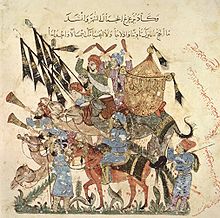 During the reign of the Harun al-Rashid, the city of Baghdad began to flourish as a center of knowledge, culture and trade.
During the reign of the Harun al-Rashid, the city of Baghdad began to flourish as a center of knowledge, culture and trade.
Harun al-Rashid, fifth Abbasid Caliph who ruled from 786 until 809. Hārūn the wise Caliph serves as an important character in many of the stories set in Baghdad, frequently in connection with his vizier, Ja'fa, with whom he roams in disguise through the streets of the city to observe the lives of the ordinary people.
Ja'far
Ja'far ibn Yahya, Ja'far (also known as Jafar al-Barmaki) was Harun al-Rashid's Persian Vizier and appears in many stories, normally accompanying Harun. In at least one of these stories, "The Three Apples", Ja'far is the protagonist of the story, depicted in a role similar to a detective. In another story, "The Tale of Attaf", he is also a protagonist, depicted as an adventurer alongside the protagonist Attaf.
Khosrau
Khosrau II was a King of Persia from 590 to 628. He appear with his wife, Shirin, in a story on the three hundred and ninety-first night called Khusrau and Shirin and the Fisherman.
Shirin
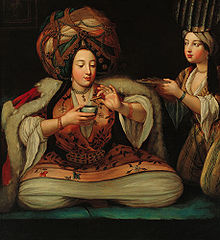 Due to her patience and understanding Shirin becomes one of the most respected Queens in the One Thousand and One Nights.
Due to her patience and understanding Shirin becomes one of the most respected Queens in the One Thousand and One Nights.
Shirin the Armenian was the Christian wife of the Sassanid King Khosrau II. She appears with her husband, Khosrau, in a story on the three hundred and ninety-first night called Khusrau and Shirin and the Fisherman.
 This literature-related list is incomplete; you can help by expanding it.
This literature-related list is incomplete; you can help by expanding it.Other minor characters
The following is a list names of persons in R. Burton’s translation of 1001 Nights. Vol.no. and pageno. follow.
Abdullah the Fisherman and Abdullah the Merman, ix. 165.
Abdullah bin Fazl and his brothers, ix. 304.
Abdullah bin Ma'amar with the Man of Bassorah and his slave-girl, v. 69.
Abd al-Rahman the Moor's story of the Rukh, v. 122.
Abu Hasan al-Ziyadi and the Khorasan Man, iv. 285.
Abu Hasan, how he brake Wind, v. 135.
Abu Isa and Kurrat al-Ayn, The Loves of, v. 145.
Abu Ja'afar the Leper, Abu al-Hasan al-Durraj and, v. 294.
Abu Kir the Dyer and Abu Sir the Barber, ix. 134.
Abu al-Aswad and his squinting slave-girl, v. 80.
Abu al-Husn and his slave-girl Tawaddud, v. 189.
Abu al Hasan al-Durraj and Abu Ja'afar the Leper, v. 294.
Abu al-Hasan of Khorasan, ix. 229.
Abu Mohammed hight Lazybones, iv. 162.
Abu Nowas, Harun al-Rashid with the damsel and, iv. 261.
Abu Nowas and the Three Boys, v. 64.
Abu Sir the Barber, Abu Kir the Dyer and, ix. 134.
Abu Suwayd and the handsome old woman, v. 163.
Abu Yusuf with Harun al-Rashid and his Wazir Ja'afar, The Imam, iv. 1.
Abu Yusuf with Al-Rashid and Zubaydah, The Imam, iv. 153.
Adi bin Zayd and the Princess Hind, v. 124.
Ajib, The History of Gharib and his brother, vi. 257.
Ala al-Din Abu al-Shamat, iv. 29.
Ali bin Bakkar and Shams al-Nahar, iii. 162.
Ali of Cairo, The Adventures of Mercury, vii. 172.
Ali Nur al-Din and Miriam the Girdle-Girl, viii. 264.
Ali the Persian and the Kurd Sharper, iv. 149.
Ali Shar and Zumurrud, iv. 187.
Ali bin Tahir and the girl Muunis, v. 164.
Al-Malik al-Nasir (Saladin) and the Three Chiefs of Police iv. 271.
Al-Malik al-Nasir of al-Yaman (Wazir) and his young brother, The, v. 71.
Al-Malik al-Nasir (Wazir) and his, vii. 142.
Amin (Al-) and his uncle Ibrahim bin al-Mahdi, v. 152.
Anushirwan, Kisra, and the village damsel, v. 87.
Anushirwan, The Righteousness of King, v. 254.
Anis al-Jalis, Nur al-Din Ali and the damsel, ii. 1.
Ardashir and Hayat al-Nufus, vii. 209.
Asma'i (Al-) and the three girls of Bassorah, vii. 110.
Ayishah, Musab bin al-Zubayr and his wife, v. 79.
Aziz and Azizah, Tale of, ii. 298.
Azizah, Aziz and, ii. 298.
Badi'a al-Jamal, Sayf al-Muluk and, vii. 314.
Badr Basim of Persia, Julnar the Sea-born, and her Son King, vii. 264.
Badr al-Din Hasan, Nur al-Din Ali of Cairo and his son, i. 195.
Barmecide, Ja'afar the, and the old Badawi, v. 98.
Behram, Prince of Persia, and the Princess Al-Datma, vi. 184.
Budur and Jubayr bin Unmayr, The Loves of, iv. 228.
Budur, Kamar al-Zaman and, iii. 212.
Bukhayt, Story of the Eunuch, ii. 49.
Bulukiya, Adventures of, v. 304.
Caliph Al-Maamun and the Strange Doctor, iv. 185.
Dalilah the Crafty and her daughter Zaynab the Coney-catcher, The Rogueries of, vii. 144.
Datma (The Princess Al-), Prince Behram of Persia and, vi. 184.
Dibil al-Khuzai and Muslim bin al-Walid, v. 127.
Duban, The Physician, i. 45.
Dunya, Taj al-Muluk and the Princess, ii. 283.
Durraj (Abu al-Hasan al-) and Abu Ja'afar the Leper, v. 294.
Eunuch Bukhayt, Tale of the, ii. 49.
Eunuch Kafur, Tale of the, ii. 51.
Fakir and his jar of butter, The, ix. 40.
Fatimah, Ma'aruf the Cobbler and his wife, x. 1.
Fath bin Khakan (Al-) and Al-Mutawakkil, v. 153.
Ghanim bin Ayyub the Thrall o' Love, ii. 45.
Gharib and his brother Ajib, The History of, vi. 257.
Hajjaj (Al-) Hind daughter of Al-Nu'uman and, vii. 96.
Hajjaj (Al-) and the pious man, v. 269.
Hakim (The Caliph Al-) and the Merchant, v. 86.
Hammad the Badawi, Tale of, ii. 104.
Hariri (Al-) Abu Zayd's lament for his impotency. Final Note to vol. viii.
Harun al-Rashid and the Arab girl, vii. 108.
Harun al-Rashid and the Slave-Girl and the Imam Abu Yusuf, iv. 153.
Harun al-Rashid with the Damsel and Abu Nowas, iv. 261.
Harun al-Rashid and Abu Hasan the Merchant of Oman, ix. 188.
Harun al-Rashid and the three girls, v. 81.
Harun al-Rashid and the two girls, v. 81.
Harun al-Rashid and the three poets, v. 77.
Harun al-Rashid and Zubaydah in the Bath, v. 75.
Hasan of Bassorah and the King's daughter of the Jinn, viii. 7.
Hasan, King Mohammed bin Sabaik and the Merchant, vii. 308.
Hatim al-Tayyi: his generosity after death, iv. 94.
Haunted House in Baghdad, The, v. 166.
Hayat al-Nufus, Ardashir and, vii. 209.
Hind, Adi bin Zayd :and the Princess, v. 124.
Hind daughter of Al-Nu'uman and Al-Hajjaj, vii. 96.
Hind (King Jali'ad of ) and his Wazir Shimas, ix. 32.
Hisham and the Arab Youth, The Caliph, iv. 101.
Ibn al-Karibi, Masrur and, v. 109.
Ibrahim al-Khawwas and the Christian King's Daughter, v. 283.
Ibrahim al-Khawwas bin al-Khasib and Jamilah, ix. 207.
Ibrahim al-Khawwas of Mosul and the Devil, vii. 113.
Ibrahim al-Khawwas bin al-Mahdi and Al-Amin, v. 152.
Ibrahim al-Khawwas bin al-Mahdi and the Barber Surgeon, iv. 103.
Ibrahim al-Khawwas and the Merchant's Sister, iv. 278.
Ikrimah al-Fayyaz, Khuzaymah bin Bishr and, vii. 99.
Imam Abu Yusuf with Al-Rashid and Zubaydah, The, iv. 153.
Isaac of Mosul's Story of Khadijah and the Caliph Maamun, iv. 119.
Isaac of Mosul and the Merchant, v. 129.
Isaac of Mosul and his Mistress and the Devil, vii. 113.
Iskandar Zu Al-Karnayn and a certain Tribe of poor folk, v. 252.
Ja'afar the Barmecide and the Bean seller, iv. 159.
Ja'afar the Barmecide and the old Badawi, v. 98.
Ja'afar bin al-Hadi, Mohammed al-Amin, and, v. 93.
Jamilah, Ibrahim bin al-Khasib, and, ix. 207.
Janshah, The Story of, v. 329.
Jali'ad of Hind and his Wazir Shimas, King, ix. 32.
Jubayr bin Umayr and Budur, The Loves of, iv. 228.
Judar and his brethren, vi. 213.
Julnar the Sea-born and her son King Badr Basim of Persia, vii. 26
Kafur, Story of the Eunuch, ii. 51.
Kamar al-Zaman and Budur, iii. 211.
Kamar al-Zaman and the Jeweller's Wife, ix. 246.
Khadijah and the Caliph Maamun, Isaac of Mosul's Story of, vi 119.
Khalif the Fisherman of Baghdad (note from Bresl. Edit.), viii. 184.
Khalifah the Fisherman of Baghdad, viii. 145.
Khawwas (Ibrahim al-) and the Christian King's daughter, r. 283.
Khusrau and Shirin and the Fisherman, v. 91.
Khuzaymah bin Bishr and Ikrimah al-Fayyaz, vii. 99.
Kisra Anushirwan and the Village Damsel, v. 87.
Kurrat al-Ayn and Abu Isa, v. 145.
Maamun, Isaac of Mosul's Story of Khadijah and the Caliph, iv. 119.
Maamun, (Al-) and the Pyramids of Egypt, v. 105.
Maamun, and the strange Scholar, The Caliph, iv. 185.
Ma'an bin Zaidah and the Badawi, iv. 97.
Ma'an the son of Zaidah and the Three Girls, iv. 96.
Mahbubah, Al-Mutawakkil and his favourite, iv. 291.
Malik al-Nasir (Al-) and the three Masters of Police, iv. 271.
Malik al-Nasir (Al-) and his Wazir, vii. 142.
Ma'aruf the Cobbler and his wife Fatimah, x. 1.
Mansur, Yahya bin Khalid and, iv. 179.
Masrur and Ibn al-Karibi, v. 109.
Masrur and Zayn al-Mawasif, viii. 205.
Mercury Ali of Cairo, The Adventures of, vii. 172.
Miriam, Ali Nur al-Din and, viii. 264.
Mohammed al-Amin and Ja'afar bin al-Hadi, v. 93.
Mohammed bin Sabaik and the Merchant Hasan, King, vii. 308.
Muunis, Ali bin Tahir and the girl, v. 164.
Musab bin al-Zubayr and Ayishah his wife, v. 79.
Muslim bin al-Walid and Dibil al-Khuzai, v. 127.
Mutawakkil (Al-) and Al-Fath bin Khakan, v. 153.
Mutawakkil (Al-) and his favourite Mahbubah, iv. 291.
Mutalammis (Al-) and his wife Umaymah, v. 74.
Naomi, Ni'amah bin al-Rabi'a and his Slave-girl, iv. 1.
Ni'amah bin al-Rabi'a and Naomi his Slave-girl, iv. 1.
Nur al-Din Ali and the damsel Anis al-Jalis, ii. 1.
Nur al-Din of Cairo and his son Badr al-Din Hasan, i. 195.
Omar bin al-Nu'uman and his sons Sharrkan and Zau al-Makan, The Tale of King, ii. 77.
Omar bin al-Khattab and the young Badawi, v. 99.
Oman, The Merchant of, ix. 188.
Otbah and Rayya, vii. 91.
Prince Behram and the Princess al-Datma, vi. 184.
Prince Behram the Ensorcelled, i. 69.
Prince Behram and the Ghulah, The, i. 54.
Rayya, Otbah and, vii. 91.
Rose-in-Hood, Uns al-Wujud and the Wazir's Daughter, v. 12
Rukh, Abd al-Rahman the Moor's Story of the, v. 122.
Sa'id bin Salim and the Barmecides, v. 94.
Sayf al-Muluk and Badi'a al-Jamal, vii. 314.
Shahryar and his brother, King (Introduction), i. 1.
Shahryar (King) and his brother, i. 2.
Shams al-Nahar, Ali bin Bakkar and, iii. 162.
Sharrkan and Zau al-Makan, The History of King Omar bin Al Nu'uman and his sons, ii. 227.
Shimas, King Jali'ad of Hind and his Wazir, ix. 32.
Shirin and the Fisherman, Khusrau and, v. 91.
Sindibad and his Falcon, King, i. 50.
Sindbad the Seaman and Hindbad the Porter, vi. 1.
Sindbad the Seaman First Voyage of, vi. 4.
Sindbad the Seaman Second Voyage of, vi. 14.
Sindbad the Seaman Third Voyage of, vi. 22.
Sindbad the Seaman Fourth Voyage of, vi. 34.
Sindbad the Seaman, Fifth Voyage of, vi. 48.
Sindbad the Seaman Sixth Voyage of, vi. 58.
Sindbad the Seaman Seventh Voyage of, vi. 68.
Taj al-Muluk and the Princess Dunya, The Tale of, ii. 263.
Tawaddud, Abu al-Hasan and his slave-girl, v. 189.
Umaymah, Al-Mutalammis and his wife, v. 74.
Uns al-Wujud and the Wazir's Daughter Rose in Hood, v. 32.
Walid bin Said, Yunus the Scribe and the Caliph, vii. 104.
Wardan, the Butcher, Adventure with the Lady and the Bear, iv. 293.
Wird Khan (King) and his Women and Wazirs, ix. 90.
Won an (The shipwrecked) and her child, v. 259.
Yahya bin Khalid and the Forger, iv. 181.
Yahya bin Khalid and Mansur, iv. 179.
Yahya bin Khalid and the Poor Man v. 92.
Yunus the Scribe and the Caliph Walid bin Sahl, vii. 104.
Zau al-Makan, The History of King Omar bin al Nu'uman and his sons Sharrkan and, ii . 77.
Zayn al-Mawasif, Masrur and, viii. 205.
Zaynab the Coney-catcher, The Rogueries of Dalilah the Wily, and her Daughter, vii.144.
Zubaydah in the Bath, Harun al-Rashid and, v. 75.
Zumurrud, Ali Shar and iv, 187See also
External links
References
- The Thousand Nights and a Night in several classic translations, including unexpurgated version by Sir Richard Francis Burton, and John Payne translation, with additional material.
- Stories From One Thousand and One Nights, (Lane and Poole translation): Project Bartleby edition
- The Arabian Nights (includes Lang and (expurgated) Burton translations): Electronic Literature Foundation editions
- Jonathan Scott translation of Arabian Nights
- Notes on the influences and context of the Thousand and One Nights
- The Book of the Thousand and One Nights by John Crocker
- (expurgated) Sir Burton's ~1885 translation, annotated for English study.
- The Arabian Nights by Andrew Lang at Project Gutenberg
- 1001 Nights, Representative of eastern literature (in Persian)
- "The Thousand-And-Second Tale of Scheherazade" by Edgar Allan Poe (Wikisource)
- Arabian Nights Six full-color plates of illustrations from the 1001 Nights which are in the public domain
- (Arabic) The Tales in Arabic on Wikisource
Categories:- One Thousand and One Nights
- One Thousand and One Nights characters
- Lists of literary characters
Wikimedia Foundation. 2010.

